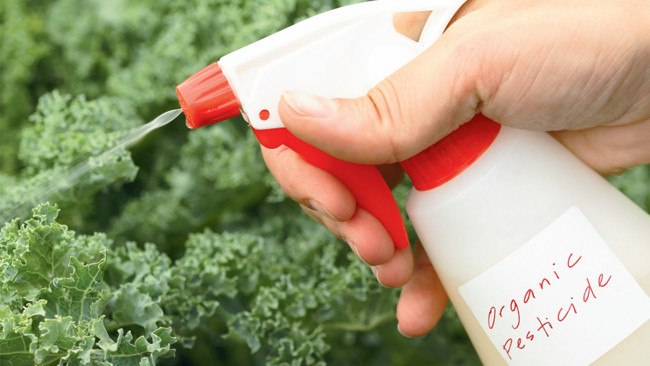Is an organic pesticide “safe” to use? Whether organic or synthetic, pesticides kill pests. If used improperly, both organic and synthetic pesticides can be harmful to pets, humans, other animals and non-target plants.
The U.S. Department of Agriculture allows organic pesticides, meaning those that are made from naturally occurring substances, to be used on “organically grown” produce. What are some of the organic pesticides used on “organically grown” produce?
Some of the more toxic organic pesticides are:
• Nicotine is toxic to warm-blooded animals and carries a “DANGER” warning label
• Rotenone is extremely toxic to fish
• Copper sulfate can build up in the soil, concentrations are toxic to mammals and fish
• Spinosad is toxic to bees
• Pyrethrin, derived from chrysanthemums, is a broad-spectrum pesticide which means it can kill any insect and is toxic to bees
Some of the organic pesticides more familiar to the home gardener are:
• Insecticidal soap, a contact pesticide that causes cells to collapse, but is ineffective after it dries
• Bt, a stomach poison specifically toxic to certain insects
• Neem oil, from the neem tree, upsets the insect’s reproduction and is slow-acting
• Horticultural oil (there are oils for all seasons; they coat and suffocate insects)
• Potassium bicarbonate, helps to control fungus
• Diatomaceous earth, used to inhibit crawling insects
There are many other commercial organic products on the market purporting to control insects, diseases and even weeds. Usually they must be applied frequently to remain effective and may contain substances harmful to humans, pets or other animals.
Whether organic or synthetic, it is the user’s responsibility to ALWAYS read, understand and follow label instructions.
“Homemade” organic remedies have not been scientifically shown to be effective and some combinations can be harmful to your plants, your pets and even you!
Before you spend money on organic or synthetic pesticides, remember to first apply the principles of Integrated Pest Management (IPM). This methodology promotes the use of traps for monitoring and capturing pests, and using cultural measures and beneficial organisms to control pests in the developing stages.
You also can enhance your garden’s fertility with natural fertilizers and soil amendments, thus increasing your plant’s health and resistance to all types of pests.
If a pesticide is necessary, choose the one that is the least toxic natural pesticide that combats insects by contact or through ingestion.
For more information on IPM, visit a plant clinic from 9 a.m.-1 p.m. Mondays at the Clallam County Courthouse or from 9 a.m.-1 p.m. Saturdays at the Demonstration Garden, 2711 Woodcock Road, Sequim.
When it comes to purchasing organically grown produce, keep in mind that it is best to buy locally from a farmer who can tell you what pesticides and fertilizers have been used on the crops.
If you grow your own produce, you definitely will know which products have been used!
Happy gardening!
Bill Wrobel is a Washington State University-certified Clallam County Master Gardener.



